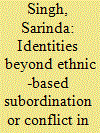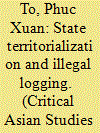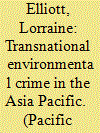|
|
|
Sort Order |
|
|
|
Items / Page
|
|
|
|
|
|
|
| Srl | Item |
| 1 |
ID:
151475


|
|
|
|
|
| Summary/Abstract |
This paper explores everyday expressions of identity by Lao villagers living in northeast Cambodia near the border with Laos, and uses this to reflect on trends in studies of identity in the remote borderlands of Southeast Asia. I argue that while ethnicity is certainly crucial, discipline-specific emphases – ethnic-based subordination or conflict for social studies and political studies, respectively – result in less attention to other important dynamics shaping identity. Furthermore, I suggest that low-profile case studies not strongly linked to ethnic-based subordination or conflict – such as the Lao in Cambodia – require study for a more comprehensive view of identity in the borderlands. The case study from northeast Cambodia identifies four key dynamics shaping identity: inter-state relations, ethno-national identities, cross-border livelihoods and social status. I show how minimal inter-state tensions and varied personal connections to Laos were important in facilitating villagers’ involvement in lucrative illegal cross-border logging in Laos, but the latter were never used to justify this practice. Instead in this everyday setting, villagers emphasised their sense of marginalisation within Cambodia and thus demonstrate their regular prioritisation of status.
|
|
|
|
|
|
|
|
|
|
|
|
|
|
|
|
| 2 |
ID:
139437


|
|
|
|
|
| Summary/Abstract |
In spite of a government logging ban and wide deployment of forest protection staff, illegal logging persists in Vietnam. This article delves into this apparent paradox, examining the dynamic relationship between state governing practices and illegal logging. Using the lens of “territorialization” and taking a historical view, the author argues that the present logging ban should be understood as one element of a range of state territorial strategies that have been implemented since the beginning of the postcolonial era – strategies that have all aimed to control local people's access to forest resources. The author explains that in the 1950s–1980s, the government officially excluded local people from accessing forest resources, particularly timber; but then, following the doi moi (renovation) in the 1980s, it launched a “regulated inclusion” of local people. In this analysis, I show how state territorialization, including the logging ban, works to create spaces of state control that can then be used to generate informal rents, both materially and discursively, for state actors. These rents in turn bolster the state in myriad ways. However, various discrepancies emerge in the process, for example between state images and practices and between different levels of state administration.
|
|
|
|
|
|
|
|
|
|
|
|
|
|
|
|
| 3 |
ID:
146098


|
|
|
|
|
| Summary/Abstract |
Indonesia is an emerging power, but one problem particular taints the success story: corruption. While corruption affects all public policies, its disastrous effects are most visible in forestry. Indonesia is still home to the third largest rainforests in the world, but the country is losing its forests fast. One main driver of deforestation is illegal logging. The strengthening of the rule of law is therefore a key to stop or at least to slow down Indonesia’s deforestation rate. The European Union has been keen to support the Indonesian government in its fight against illegal logging in accordance with the European Forest Law Enforcement Governance and Trade Policy (FLEGT). In September 2013, Brussels and Jakarta have signed a FLEGT Voluntary Partnership Agreement (a FELGT-VPA, more commonly known as “Timber Pact”). Under the Timber Pact, Jakarta promises an overhaul of its forest governance. This reform of forest governance is costly to the Indonesian government, in financial and political terms. After all, many actors profited from the old system. The question arises why the Indonesian government agreed to the Timber Pact. In the first part of the analysis, a rationalist perspective is taken to answer this question, focusing on the political and economical gains for the decision-makers. The second part looks at the issue from a constructivist angle and shows how the norm “fight illegal logging” fitted into the normative framework of Indonesian politics. By combining a rationalist and a constructivist perspective, a broad picture of successful EU norm diffusion is painted.
|
|
|
|
|
|
|
|
|
|
|
|
|
|
|
|
| 4 |
ID:
080572


|
|
|
|
|
| Publication |
2007.
|
| Summary/Abstract |
While other forms of transnational crime in the Asia Pacific have been securitized - that is, represented by policy elites and security actors as crucial or existential threats to national and regional security - transnational environmental crime has been un(der)securitized. It warrants little mention in regional security statements or the security concerns of individual countries. Yet the consequences of activities such as illegal logging and timber smuggling, wildlife smuggling, the black market in ozone-depleting substances and dumping of other forms of hazardous wastes and chemical fit the (in)security profile applied to other forms of transnational crime. This article surveys the main forms of transnational environmental crime in the Asia Pacific and assesses the 'fit' with a 'crime as security' framework. It shows that transnational environmental crime generates the kinds of 'pernicious effects on regional stability and development, the maintenance of the rule of law and the welfare of the region's people' that the ASEAN Declaration on Transnational Crime identified as matters of serious concern. The analysis draws on securitization theory to understand the lack of a 'securitizing move' and to explain why security elites do not believe the problem warrants serious attention. The possibilities explored here include intellectual inertia, confusion about referent objects, institutional incapacity, mixed policy signals and the exclusion of environmental expertise from a closed community of security elites
|
|
|
|
|
|
|
|
|
|
|
|
|
|
|
|
|
|
|
|
|